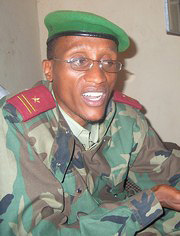
Photo: IRIN  |
| WFP trucks need armed escorts to deliver food aid in eastern DRC |
GOMA, 8 October 2007 (IRIN) - Chronic violence in eastern Democratic Republic of Congo has cut 150,000 vulnerable people off from humanitarian aid, deepening an already severe crisis, according to the UN World Food Programme (WFP).
Since fighting erupted between dissident general Laurent Nkunda and the Congolese army in December 2006, about 370,000 people have been displaced from their homes in North Kivu province, resulting in alarming hikes in malnutrition rates.
Humanitarian workers also warn of the risk of malaria, cholera and measles epidemics in rural areas that have been cut off from the delivery of medications.
"It's a bit of an anarchy situation out here," Aya Shneerson, the head of WFP in North and South Kivu provinces, told IRIN. "In some parts, we have tens of thousands of people who have fled conflict, who are living in deplorable conditions, who really need our help, and we just can't get there."
Fighting in the region has abated since clashes in September between Nkunda's National Congress for the People's Defense (NCPD) and the Forces Armées de la Republic Democratic du Congo (FARDC), the national army; but sporadic eruptions of violence have kept most humanitarian workers confined to Goma, capital of North Kivu.
Further complicating the already thorny situation, observers say, are Mayi-Mayi and Hutu militia groups, which have been recruited to help bolster Congo's weak, demoralised national army to put down Nkunda's rebellion.
Roads targeted
The movement of armed groups operating along the roads to reach vulnerable populations has prevented UN agencies and many international non-governmental organisations from delivering food aid and non-food items.
"They won't let our trucks pass by," Shneerson said. "At this point, the UN agencies are dependent on armed guards."
The UN Mission in the DRC (MONUC), with 17,000 peacekeepers, has been facilitating transport for humanitarian convoys.
While looting of food aid and medical supplies has not become a serious problem, aid groups say recent developments are cause for concern.
"Today what we have started to see is that some groups are reluctant to see humanitarian assistance being provided to the other side, to their enemies," said Patrick Lavand'Homme, who heads the UN Office for the Coordination of Humanitarian Affairs in Goma.
"We do a lot of advocacy with the different armed groups to let them understand that the aim of humanitarian assistance is to assist vulnerable people and not to assist any military group," Lavand'Homme said.
"We are very worried about the future," he added. "The army and Laurent Nkunda seem to be building up their strength, which does not make us foresee a peaceful solution."
Congolese President Joseph Kabila has set a deadline of 15 October for all armed groups to integrate their forces into the national army, though it is unclear what the penalty will be if groups refuse.
Congo's armed forces are notoriously disorganised, with soldiers waiting months to receive small salaries. The army often finds itself outmanned and outgunned in the region's dense forests by guerilla groups organised along ethnic or local lines.
Ethnic tensions rising
Nkunda, an ethnic Tutsi, has repeatedly said he would not integrate into the army until Hutu militias known as the Forces Démocratiques de Liberation du Rwanda (FDLR), linked to the perpetrators of neighbouring Rwanda's 1996 genocide, are neutralised.
Nkunda broke ranks with the Congolese army in 2004, charging that not enough was being done to protect Congo's ethnic Tutsi population from attacks by Hutu militias.
But Congo's administration and international observers, including advocacy group Human Rights Watch, charge that Nkunda's forces are also guilty of atrocities against civilians, including rape, looting and murder.
Observers say ethnic tensions in the region have only grown since Nkunda's most recent campaign in August.
"One situation that we are witnessing over the last month is that we have more and more ethnic-based population movement," Lavand'Homme told IRIN. "This is worrying because it means that within the community, there is deeper destabilisation of inter-ethnic living and this could become more serious if peace is not restored quickly enough."
Civilians under siege
Humanitarian workers caution that if violence continues, civilians will bear the brunt of the fighting.
"In some areas in North Kivu, in some parts of Rutshuru, we have 19 percent global malnutrition," Shneerson said. "That's huge. That's something that you saw in Niger."
Most of the recent displaced are impoverished farmers, already eking out a tenuous existence.
"They really are 100 percent dependent on what they grow, and if they are forced out of their homes, they don't have anything to eat," Shneerson said.
Humanitarian workers also warn that if the displaced are not able to return for the upcoming planting seasons, fields in the region will lie barren and a severe food crisis could result.
nk/mw











